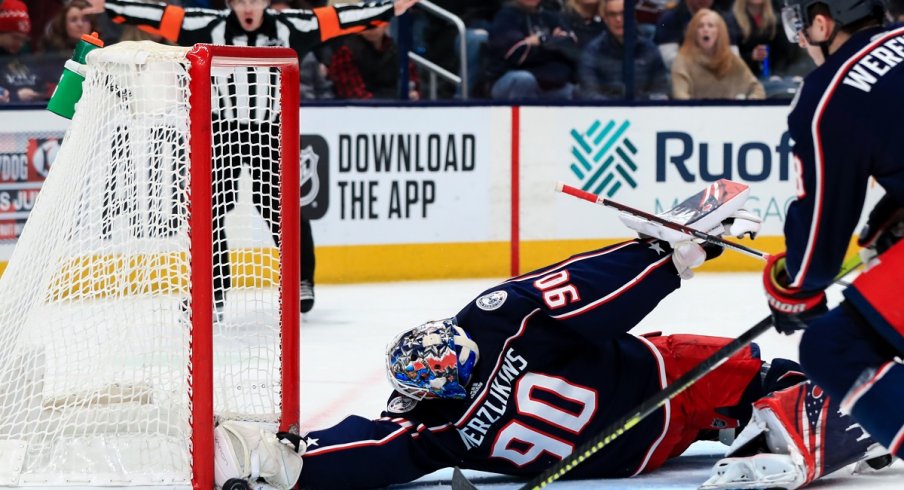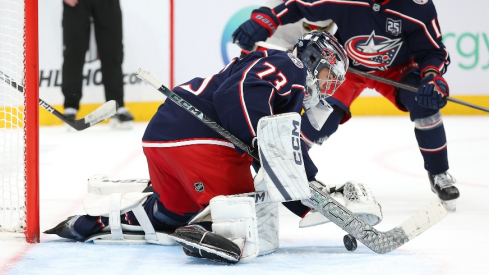An old hockey adage is 'if you have two goalies, you don't have a goalie.'
The NHL disagrees. As teams invest more in sports science, it's become commonplace to see goalies split games more equitably. Even 10 years ago, it wasn't all that uncommon for a star goalie to start 70 of the 82 regular-season games (six in 2009-10, three in 2010-11). Since 2016-17 (Cam Talbot, 73), no goalie has started more than 70 games in a season.
Tuukka Rask and Jaoslav Halak of the Boston Bruins were recently named winners of the William M. Jennings Trophy, given annually to the goaltenders who played at least 25 games for the team with the fewest goals allowed over the regular season. The duo serves as a model to be replicated by the rest of the league. Columbus also successfully utilized the tandem goalie strategy this year. One similarity between the two is particularly striking; both teams saw injuries to their number one in the middle of the season, allowing the back-up to see consistent playing time for an extended period of time. When Joonas Korpisalo went down with an injury in late December, Elvis Merzlikins entered (the building) and went on a heater that puts him as a darkhorse for the NHL's Calder Trophy given to the league's best rookie.
The difference between the two tandems is also clear: Halak is clearly the back-up, while Rask is the obvious starter for the Bruins. But in Columbus, it's a different story.
The Case For Joonas Korpisalo
Korpisalo waited his turn behind Sergei Bobrovsky for four seasons before finally having a permanent shot at the starter's net. He was named an All-Star in his first year as the de facto starter and posted the highest quality start percentage of his career (.600).
The club knows what they'll get from Korpisalo on most nights: solid but unspectacular play. His .911% Sv% and 1.14 goals saved about average (GSAA) put him closer to the bottom than to the top of starting goalies in the NHL. On the other hand, the Maple Leafs will lean on Frederik Andersen, who posted a .909% and -0.40 GSAA, meaning he was worse than average. In some ways, having a goalie who fits this profile (solid but unspectacular) is exactly what the doctor ordered: it will still be on par or slightly better than Toronto, but it won't necessarily determine the winner in isolation.
The Case For Elvis Merzlikins
Merzlikins is Korpisalo's foil. Loud both in terms of personality and his movement in the crease, the Latvian has a much wider range of outcomes. His five shutouts in 31 starts represent by far the highest percentage in the league. When the NHL paused its season, Merzlikins was tied for second in the league in shutouts with Rask despite starting 10 fewer games, and one behind Connor Hellebuyck, who had 25 more starts than Merzlikins. On the other hand, his .548 quality start percentage ranks lower than one would want for a starting goalie, particularly in the playoffs where the stakes are so high. For what it's worth, a .530 is league average, per Rob Vollman's Hockey Abstract.
In a short series, every goal is monumental. That's what makes Merzlikins such an interesting case study. Yes, every goal is crucial - so play the goalie who gives up fewer and has the potential to pitch a shutout. After all, it's hard to lose when you give up zero. On the other hand, playing a goalie who is statistically less likely to provide a quality start seems like a dicey proposition, particularly when (as we've established) it's a short series.
Putting A Bow On It
Blue Jackets management/coaches have unquestionably come up with a game-plan, and it would make sense to ride the hot hand. That is to say, after their training camp, they'll go with one (let's say it's Korpisalo since he started game one of the regular season, though much has changed) and give him a chance to establish himself as the guy. To me, that makes way more sense than alternating games. But the leash will be shorter than ever, and we've seen what Merzlikins can do when he's given the reigns.
I believe the Blue Jackets should go with Merzlikins out of the gate. He's the player with the higher ceiling and could act as a neutralizer to Toronto's elite offense. I also happen to think he's the goaltender of the future in Columbus, and giving him playoff reps make sense, with the caveat that if he struggles in Game 1 and Game 2, I'd turn it over to Korpisalo.

